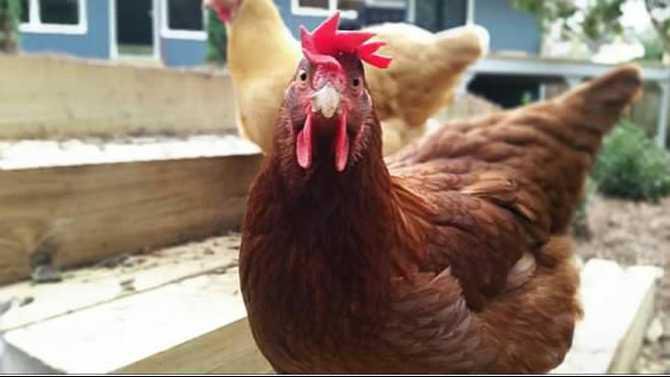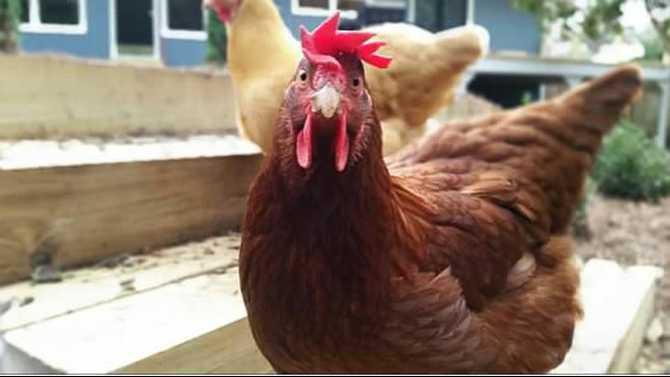On one hand, proponents believe there are lots of advantages to hosting chickens in the backyard. In fact, the only disadvantage, most people have said, is the amount of work that goes into taking care of them.
Because raising chickens can take a lot of work.
“There’s a flourishing hobby of backyard animals all over the state,” said Stephen Pettis, University of Georgia County Extension Agent in Rockdale County. “It’s a trend, an up-and-coming thing.”
“A lot a people think they want to see chickens walk around [their] backyard,” he said. “But they’ll flip blocks and bricks over, [scratch up] grass and flowers, looking for worms, and they use the bathroom all over the place.”
Pettis said he wouldn’t recommend raising chickens to most people. In fact, it’s illegal in the city of Conyers to raise chickens, and there are strict zoning ordinances for raising chickens in the county.
While some livestock may be allowed within Covington city limits, and Newton County permits livestock, it’s important to check zoning requirements, subdivision covenants and other ordinances, said Ted Wynne, University of Georgia County Extension Agent for Newton County.
He, too, thinks renting chickens might be a good first attempt, “until people stick their toe in the water and get a feel of what it’s like. It’s not an easy thing as far as the labor is concerned. You have to manage them to keep them healthy.”
Chickens, Wynne said, aren’t particularly long-lived. “People get attached to them, but when it comes to farming, if you’re going to have chickens, you have to realize they’ll come down with something from time-to-time and you’re going to lose a few.
“Three to four years is about how long [backyard chickens will] be in production,” he said. “And you can’t just pick up and go on vacation. You have to make provisions for them—and that’s something people don’t think about.”
Pettis said he thinks people his age and younger have a more romantic view of farming then his parents or grandparents. “My generation grew up getting all of our food from the grocery store. They have a desire to start a small farm. One of the things I do is try to be frank with them about how much work is involved.”
That’s why, he said, he thinks renting a chicken could be a great idea.
Two local companies—one in downtown Atlanta and one outside of Athens—are offering people a chance to rent a chicken to see if they do liking caring for the backyard livestock.
Elder Tree Farm [http://eldertreefarm.com/] outside of Athens just started renting chickens this spring. It’s been so popular, they have been taking reservations for chicken rentals.
Though packages vary, the basic four-week backyard chicken rental runs $160 and includes two hens, a moveable coop, watering container, feeder and a 40 pound bag of feed.
“It’s just a way for people to try chickens,” said owner Matt Farfour. They get a chance to see what it’s like to take care of chickens, gather eggs and get a sense of where their food comes from.”
Not everyone has enjoyed the experience, and the chickens are returned. Others have purchased the chickens they rented.
For Heath Ward, co-owner of City Chicks in Atlanta [http://www.citychickatl.com/], getting into the business of renting chickens grew out of a gift he’d received a couple of years ago.
“We received two hens as a gift and we just thought they were amazing,” he said. “A lot of friends stopped by and asked about keeping chickens. We brainstormed about an idea where people could try out having chickens in the city—that’s how the idea hatched.”
Like Farfour, Ward says the response to the business has been great. “This gives people a chance to try it out – and if they don’t like having chickens or having to collect eggs, they can give them back. A really cut baby chick can live to be eight to 10 years old.
“You try it out and see if you like it, and after awhile, people can even buy the chickens,” he said.
He said part of the package City Chicks offers includes a course in Chicken 101. They go over feeding and watering the animals, cleaning and managing them, and, the request he gets most, how to catch a chicken.
The interest in backyard poultry has grown out of the movement towards sustainable gardening and urban farming. “People just really want to know more about where their food is coming from,” said Ward. “
Farfour agrees.
“You know what the chickens are fed,” he said. “If you have chickens, you see where the eggs come from. If the chickens are healthy, the eggs are healthy.”
Pettis said that “the constant media barrage of scary news, whether it’s true or not, [makes] people want to get closer to where their food comes from. That’s definitely a driving factor.”
“Knowing that the chickens are raised without any kind of insecticide and other things that people don’t really want in their food supply” can be satisfying, Wynne said. “A lot of people say they like the taste [of the eggs] better. The yolk looks deeper, richer and people think it tastes better.”
Raising chickens is something Wynne encourages, saying it’s a relatively inexpensive project for children, one that teaches responsibilities. The UGA Extension offices have resources to help people learn more about raising and housing chickens.
Interest in backyard chickens has increased the demand for classes to help people in the effort. Wynne said he’s been asked repeatedly to offer candling classes, which is how the size and grade of eggs are determined. “If you want to sell extra eggs at the market or locally, you have to have a candling license.”
A candling class is being offered Thursday, Oct 1, from 8 a.m. to 4 p.m. at the Rockdale County Extension Office, 1400 Parker Road, Lobby B, Conyers. The cost is $25.00 and includes training and lunch. Registration deadline is Thursday, Sept. 25. Both Pettis and Wynne will be among the instructors.
“Four years ago, if you would have told me I would have a business dealing with chickens, I would though you’d need to be locked up,” said Ward.






